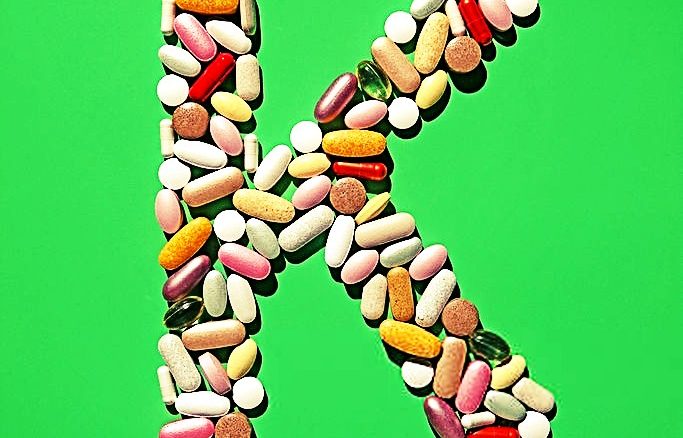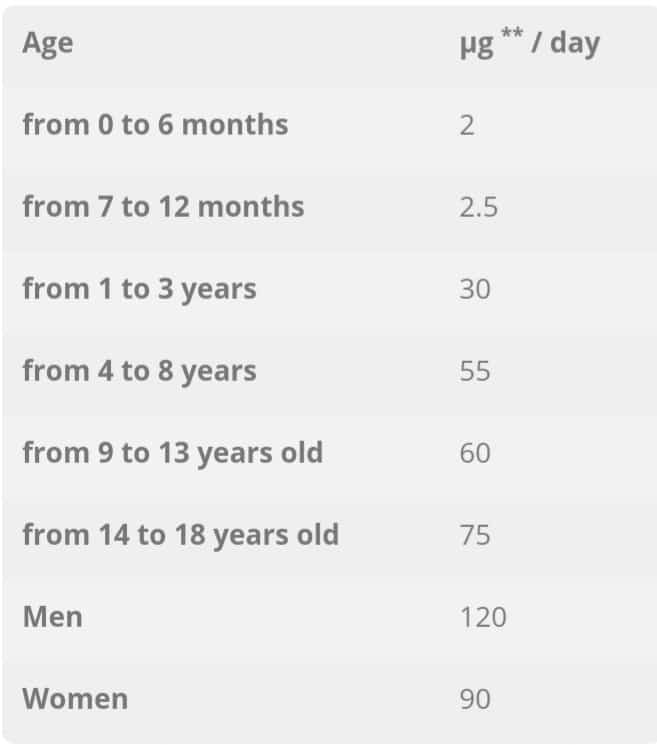
Contents
Vitamin K: Description, Food Sources, Deficiency, Precautions, Interactions
indications
- Prevent and treat osteoporosis.
- Prevent cardiovascular disorders.
Note. In conventional medicine, high doses of vitamin K are used to counteract the harmful effects of an overdose of warfarin (an anticoagulant) or a failure of blood coagulation.
Read Also: Six Essential Nutrients Which Are Important For Your Body
Dosage of vitamin K
- The data are insufficient to suggest a therapeutic dosage. In a few studies in Western subjects, 200 μg to 1000 μg (1 mg) of vitamin K1 per day was used. For trials conducted in Japan, 45 mg of vitamin K2 per day, that is, a very high dose, was frequently administered.
Sufficient intake of vitamin K

Source: Dietary Reference Intakes for Vitamin A, Vitamin K, Arsenic, Boron, Chromium, Copper, Iodine, Iron, Manganese, Molybdenum, Nickel, Silicon, Vanadium, and Zinc (2002). Food and Nutrition Board, Institute of Medicine, USA.
These data are the result of a consensus between Canadian and US authorities.
* In the absence of sufficient scientific data. The authorities have established, not a recommended nutritional intake (RDA), but a sufficient intake (AS). Sufficient vitamin K intake is based on average intakes in healthy North Americans.
** 1 μg = 1 microgram, that is to say, 1 millionth of a gram.
Read Also: Magnesium: Health benefits, deficiency, sources, and risks
Description of vitamin K
This vitamin is a fat-soluble vitamin (soluble in fat). Its name comes from German Koagulation, an allusion to the role it plays in blood clotting. There are two main forms of this vitamin: phytomenadione, or vitamin K1, which comes mainly from green vegetables, and menaquinone, or vitamin K2, which is produced by bacteria in the colon or that appears in certain foods as a result of ‘a fermentation process (cheese, miso, natto, etc.).
Vitamin K1 more directly involved in the process of coagulation, whereas K2 acts rather on calcification of soft tissues.
In North America, as well as in most European countries, vitamin K1 is found in the form of medications, supplements or multivitamin supplements.
There is a synthetic form, vitamin K3 (or menadione), which is no longer used in North America because it has been linked to liver toxicity. It is now limited to veterinary use.
Read Also: Vitamin B Foods Which Are Important For Your Health
Food sources of vitamin K
Vitamin K1: green vegetables (especially dark ones such as spinach, broccoli, and asparagus), algae and, to a lesser degree, soybean oil (9 μg per tablespoon) and canola (6 μg by tablespoon). For example, one cup of cooked broccoli (200 g) provides 220 μg of vitamin K1 and one cup of cooked spinach (200 g), 888 μg.
Vitamin K2: Vitamin K2 is found in miso (fermented soybean paste), liver, milk, cheese, yogurt, and fish oils.
Read Also: 50 Foods That Are Super Healthy
Vitamin K deficiency
Frequent in newborns, vitamin K deficiency is treated by supplementation. Rare in adults, a deficiency can nevertheless appear in case of severe liver disease, bile ducts or intestine, which then requires drug treatment.
Vitamin K deficiency causes a failure of blood coagulation (hypoprothrombinemia).
Epidemiological studies indicate that the lower the vitamin K intake, the greater the risk of fractures. Suggesting that vitamin K deficiency, even when asymptomatic, could accelerate osteoporosis.
History of vitamin K
The vitamin K1 was first isolated in alfalfa. Two biochemists, the Danish Henrik Carl Peter Dam and the American Edward Adelbert Doisy, shared the Nobel Prize in Medicine or Physiology in 1943 for their discoveries on vitamin K, a clotting factor.
The vitamin K2 was then detected in a fermented fish meal. It has also been discovered that our colon produces this same molecule when its intestinal flora was healthy and plentiful.
Japanese researchers have developed a so-called “functional” natto (pressed and fermented soya beans). This product is made by fermenting soy with a strain of bacteria specifically selected for its ability to produce good amounts of vitamin K2.
Within a FOSHU (Food for Specific Health Use) program, implemented by the Japanese Ministry of Health, there is no hesitation in claiming that this Natto can help prevent it. osteoporosis. In Japan, a particular form of vitamin K2 (MK-4) is a recognized treatment for osteoporosis.
Since October 2005, supplements have been available over-the-counter in Canada, provided that the recommended daily dosage does not exceed 120 μg per day.
Research
Osteoporosis. Most epidemiological studies indicate that vitamin K deficiency is associated with a reduction in bone density and an increased risk of fractures in people over 60 years of age and postmenopausal women. (1)
In 2003 and 2004, two studies in postmenopausal women showed that vitamin D and calcium supplements increased bone density or slowed its decrease more markedly if they were combined with vitamin K1. These results were contradicted in 2008 by other researchers, who noted, however, an improvement in the indices of bone demineralization. (2)
According to a major study published in 2008, vitamin K1 would not prevent the decline in age-related bone density. On the other hand, it would significantly reduce the possibility of fractures in women with osteopenia. (3)
Concerning vitamin K2, studies and meta-analyses show that a high dose of this vitamin (45 mg per day), absorbed alone or with vitamin D3 or calcium, may increase or preserve the bone density in postmenopausal women. It also reduces the risk of fracture in people with vitamin K deficiency or osteoporosis.
Cardiovascular protection. Vitamin K may play a protective role against atherosclerosis and cardiovascular diseases. Indeed, a link has been established between vitamin K deficiency and an increased risk of arterial calcification. Researchers have also shown that taking vitamin K1 supplementation slows the progression of the calcification or reduces the loss of elasticity of arteries. Finally, women with osteoporosis after menopause have a greater risk of developing atherosclerosis.
Precautions
Warning
- Warfarin users are generally advised to avoid changing their vitamin K ( food or supplement ) intake in a pronounced manner to ensure the stability of the effect of this anticoagulant drug.
- The absorption of vitamin K can impair by alcoholism and the use of mineral oil (paraffin oil or petrolatum).
- Undesirable effect
- Even at very high doses taken for one or two years. This vitamin did not cause any significant side effects.
interactions
With plants or supplements
- Taking large doses of vitamin K can:
- In theory, reduce the anticoagulant effect of certain herbs or supplements (eg garlic, ginkgo, red clover).
- High doses of vitamin E may counteract the effect of vitamin K.




